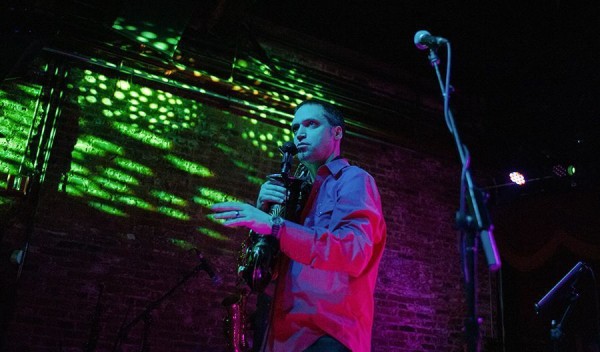Words by James Farrell | Photo by Mark Dershowitz
John Medeski’s bottom lip fluttered unconsciously as he played the keys. His eyes were closed, both arms floated masterfully over his instrument. The notes his keyboard produced weren’t so much a melody, at least by conventional standards. One hand haphazardly scattered dissonant, otherworldly patterns over the other hand’s muddy bass lines. Whether he was silently singing these ungodly parts to himself or humming exotic incantations, his body had become merely a vehicle for these sounds to come into being.
Great improvisation can have that effect – it takes on a sentient presence, one that lives inside the performers who produce it and infects the space it inhabits. And at the earlier of two DRKWAV (pronounced Darkwave) shows, the patrons of Boston’s Regattabar experienced great improvisation at the hands of three well-traversed vets experimenting in the frightening darkness of untraversed worlds.
Saxophonist Skerik (Les Claypool’s Fancy Band, Garage a Trois, Critters Buggin’), drummer Adam Deitch (Lettuce, Break Science), and keyboardist Medeski (Medeski, Martin & Wood, The Word) formed DRKWAV after being told to do so in a dream, a “collective hallucination,” as they describe it. Their largely improvised music fearlessly plunges into dark soundspaces consisting of thick keyboard patches and organ swells, savagely urgent drum rhythms of great complexity, and experimental saxophone. It’s an energy, a dystopian mixture of Pink Floydian adventure, old-school funk, and demonic Miles Davis, and it lives and breathes through performance.
DRKWAV’s set at the Regattabar felt more like an hour-long expedition than it did a show. There were no definitive start and stop points between songs, and there was a sense that everything was being performed for the first time. When he wasn’t playing saxophone, Skerik’s mouth fluttered in mimicry of Medeski’s. Deitch remained stoic behind the kit, constantly varying his rhythms, letting his arms bring him to jarring places of irregularity and complexity.
While Medeski played through his parts, handling the keyboard bass, as well as the keyboard leads and swells, Skerik floated around his area with sax strapped around his neck. He was like a scientist, manipulating the instrument’s possible sounds to its absolute limits. Using a touchscreen pad and effects pedals, Skerik filtered the traditional sounds of the saxophone through the bite-sized microphone hovering over the sound hole and into a different musical language: fleeting swoops from other dimensions, heavily reverbed and distorted melodic lines, thick electronic sounding patches on loop. Deitch’s drumming was the only familiar sound anchoring the group to our world, and as he continued to deconstruct his beats and lag his rhythms, that anchor hinted at disintegration.
The Regattabar is a compact, classy venue. Its patrons sat at round tables with their chairs positioned towards the area of the floor designated as a stage. Their heads bobbed back and forth; closed eyes, slight smiles on their faces. Strange sound effects came over the speakers, and it was difficult to tell if it was spontaneously created or a prerecorded loop. Some people laughed at the ridiculousness, others remained in their rhythmic trances. It’s likely that not everyone in the room understood DRKWAV. But the band’s very essence of performance is to be misunderstood, to tear down the restrictions of our world, and to usher in a new, much darker world. And even though the performance might have been a little short (a little over an hour), that world was brought to fruition in full form.
Check out our recent interview with DRKWAV here…
www.facebook.com/DRKWAV
TheWaster.com | Boston
3.11.15



